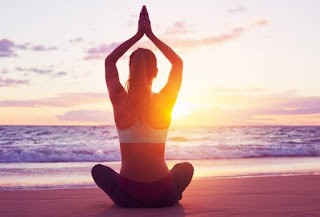What do John Boehner, Bonnie Raitt and prisoners at Sing Sing have in common? Like 36 million other Americans, they do yoga, according to the April/May issue of AARP The Magazine, which features a special health section on "The United States of Yoga."
It's an ancient practice, after all.
It's also one that doesn't discriminate by age. Of the folks who do it, 39 percent are older than 50, the magazine reports. And if you're interested in following its advice "to take a deep breath and join in," it suggests the most suitable styles for seniors. (In your 60s, for instance, try Iyengar, which "emphasizes precise alignment, deep stretching and holding for long moments.")
Online, you can view a free quickie lesson that is geared to seniors and led by Lorrie Lynch, a certified instructor who also is AARP's features director. The five-minute video introduces newbies to a few simple standing poses, all of which are helpful for improving bone density as we age, Lynch points out.
Yoga is an ancient practice with origins stretching back thousands of years in India. It is designed to help achieve a more positive outlook on life and a focused, permanent sense of serenity and peace. The word ‘yoga’ itself means ‘union’ and ‘union with the divine’; however, many people have stripped away the spirituality and focus of yoga so that most think of it as a group of intensely athletic people putting their legs behind their heads and curling up into jaw-dropping positions.
For the magazine, Lynch contributes an essay that offers the most compelling case for yoga. The first line is "Yoga has saved my life, twice." Lynch recounts how she used gentle yoga to recover after a quadruple coronary bypass operation. Although she had practiced before the surgery, "I did not really 'get' the breath and meditation part of it until I was in serious need of physical healing," Lynch writes.
Fast-forward seven years, and Lynch was laid off from a company she'd worked at for three decades. To deal with her "shattered ego," she returned to the mat. This time, she made vigorous, hot power vinyasa classes a daily habit. "I was sweating out all the hurt and resentment," Lynch adds.
Both experiences were transformative, and that's what Lynch hopes to convey to anyone who's hesitant about taking a class. And maybe you'll run into Bonnie Raitt.

No comments:
Post a Comment